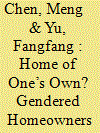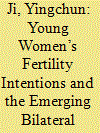|
|
|
Sort Order |
|
|
|
Items / Page
|
|
|
|
|
|
|
| Srl | Item |
| 1 |
ID:
174410


|
|
|
|
|
| Summary/Abstract |
China has witnessed the rise of cohabitation and the delay of marriage among young people, but less attention has been paid to cohabitation as a process of living arrangement that may create new room to define gender roles or replicate conventional gender relations. Previous studies have debated on whether cohabitation is an egalitarian union with more symmetric bargaining power and individualistic pursuits, and this study sheds light on how young people in China negotiate their gender role ideologies in cohabiting unions. Based on in-depth interviews with 18 cohabiting couples in Guangzhou, Shenzhen, and nearby cities in South China, this study finds that men were more divided in their gender role ideologies and women were predominantly favorable toward egalitarian beliefs. In the “intended egalitarian” couples, both partners supported egalitarian ideals and reported sharing housework equally, which served men’s family-oriented masculinity and women’s individualistic pursuits and self-development. In the “discordant” couples, with a typical “traditional man and egalitarian woman” combination, traditional men were more defensive than egalitarian women. Most discordant couples adopted traditional arrangements, and only a few traditional men tolerated egalitarian arrangements as “temporary” due to their unemployed status or other real-life constraints. Both the celebration of egalitarian ideals in some couples and the persistence of traditional arrangements in others reflect the mixed and uneven trends of gender equalization in the reform-era China.
|
|
|
|
|
|
|
|
|
|
|
|
|
|
|
|
| 2 |
ID:
174408


|
|
|
|
|
| Summary/Abstract |
As market reforms and socioeconomic development have transformed the Chinese economy, family life in rural and urban areas has also been directly and indirectly altered. Yet demographers who observe the rise of singlehood and sub-replacement fertility find confirmation of the universal application of theories in support of the Second Demographic Transition (SDT), while others find that high rates of marriage, near absence of births outside of marriage, and continuing centrality of inter-generational aid flows call for a more nuanced approach in China. In response to the still limited research on this rising diversity of contemporary family life in China, this special issue provides both theoretical insights and empirical evidence to examine how individualistic and familial values coexist, clash, and interact in different aspects of family life, and how gender relations and intergenerational politics have evolved at the same time.
|
|
|
|
|
|
|
|
|
|
|
|
|
|
|
|
| 3 |
ID:
174414


|
|
|
|
|
| Summary/Abstract |
Using tobacco industry workers’ applications for Wuhu General Labor Union (蕪湖總工會 wuhu zong gonghui), this article examines the role of guanxi (關係) in job searches before and after the socialist transformation in the early 1950s. We reject the conventional view that guanxi was extensively used in the early socialist system. Rather, guanxi, particularly kin ties, was vital for obtaining good jobs before the socialist transformation, but its role was sharply restricted after the job assignment system was established in the early 1950s. This system was particularly advantageous for workers who were young and female and lacked appropriate guanxi to access good jobs. These findings suggest that a more accurate understanding of the early socialist period would enrich the debate about the role of guanxi in market reform.
|
|
|
|
|
|
|
|
|
|
|
|
|
|
|
|
| 4 |
ID:
174413


|
|
|
|
|
| Summary/Abstract |
This article contributes to the existing literature on housing inequality in China with new empirical evidence from a gender perspective. Using four rounds of data from the Chinese General Social Survey and adopting individuals as the unit of analysis, the study explores gender disparity in homeownership in urban China. Using binary logistic regression models, we reveal a profound gender gap in individual chance of being homeowners. While men and women may be similarly affected by several characteristics, women’s chance of owning household housing assets is more likely to be affected by factors relating to the private sphere of family life, such as family of origin, number of brothers, and changes in marital status. We emphasize that gender inequality in housing circumstances is an important part of social stratification. To gain a comprehensive understanding of the issue, researchers need to reflect upon the explicit and implicit belief in using family as the unit of analysis.
|
|
|
|
|
|
|
|
|
|
|
|
|
|
|
|
| 5 |
ID:
174411


|
|
|
|
|
| Summary/Abstract |
Over the past two decades, migratory arrangements among married couples in China have become more diversified, owing to the greater participation of married rural women in migration. Using data from the 2012 and 2014 China Family Panel Studies (CFPS), the present study systematically investigates the happiness of husbands and wives involved in these migration arrangements: being left behind, migrating alone, and migrating together with the spouse. We mainly address two research questions. First, what is the relationship between different migration arrangements made by couples and the happiness of husbands and wives? Second, is this association explained by their perception of their spouse’s economic and housework contributions to the family? Our findings indicate that migrating together is positively associated with the happiness of wives and being left behind has a strong negative association with the happiness of husbands. We found that for women who migrate with a spouse, happiness can be explained by increased satisfaction with the husbands’ economic contribution. In addition, for men, the negative relationship between being left behind and happiness can be explained away when the husband is satisfied with the wife’s economic and housework contributions.
|
|
|
|
|
|
|
|
|
|
|
|
|
|
|
|
| 6 |
ID:
174409


|
|
|
|
|
| Summary/Abstract |
We investigate whether attitudes about gender in China have changed across birth cohorts. Using data from the 2010–2015 Chinese General Social Survey (N = 34,588), we differentiate two distinct dimensions of beliefs about gender: gender equality in the labor market (public sphere) and gender roles in the family (private sphere). Both men and women show rising support for egalitarian attitudes about gender in the public sphere across cohorts, even after we control for compositional changes in successive birth cohorts’ sociodemographic attributes. In contrast, all else being equal, we observe continued (among women) and even rising (among men) support for traditional ideology about gender in the private sphere across cohorts. Moreover, women hold more egalitarian gender attitudes toward work and family. This gender gap in gender attitudes has widened among the more recent cohorts, due in part to the closing of the gender gap in education and the stronger positive effect of education on gender egalitarianism among women than among men. The results highlight the importance of understanding gender ideology as a multidimensional construct in China. We conclude by discussing the findings in the context of the uneven gender revolution and two-sphere separation in contemporary China.
|
|
|
|
|
|
|
|
|
|
|
|
|
|
|
|
| 7 |
ID:
174415


|
|
|
|
|
| Summary/Abstract |
The formation and rise of African neighborhoods in Guangzhou, particularly Xiaobei (小北), have recently aroused much scholarly concern. The Africans’ spatial cluster imparts knowledge, allows for the exchange of information, is a hub of business and acts as a spiritual home, which links the businesses and lives of Africans, who may live far away, to Xiaobei. However, the formation and development of this spatially concentrated area were not natural and arbitrary; they were strictly controlled by the state and local administrative regime. Based on ethnographic research in Xiaobei, we found that the high ethnic-social diversity, high mobility, nonintegration, and network of the members of the neighborhood differ in nature from ghettos, immigrant/ethnic neighborhoods, or immigrant/ethnic enclaves in typical immigration countries. As such, we argue that the traditional term “immigrant” or “transmigrant” neighborhood, which developed on the basis of migration phenomena in the Global North, cannot address the Africans in Guangzhou properly. Therefore, we turn to the term “transient neighborhood” to better understand recent “immigration” in Chinese cities. In this vein, we articulate the flexibility and instability of recent glocalization and how the state plays an increasingly significant role during the process.
|
|
|
|
|
|
|
|
|
|
|
|
|
|
|
|
| 8 |
ID:
174412


|
|
|
|
|
| Summary/Abstract |
China’s total fertility rate (TFR) has been below replacement level since the 1990s and below 1.5 since the 2000s. To address the issue of low fertility and rapid aging, the Chinese government replaced the strict one-child family planning policy with the selective two-child family planning policy in 2013 and then the comprehensive two-child family planning policy in 2015. However, a strong baby boom did not ensue, and births hit a record low in 2018. It is thus vital to understand fertility motivation among younger generations of women. Collecting qualitative data in a small city in the Yangtze Delta, we found that the high costs of current practices of child raising and education are prominent factors in women’s mind-sets, and that bilateral family support, including but not limited to help with finances and care, is the cornerstone of this expensive, modern child raising model. A complex, bilateral family model has gradually grown out of the patriarchal system. Grandparents on both sides collaborate with the mother at different times of the day and in different stages of children’s development. A familial relay race of child care reduces the mother’s work-family conflicts. The sustainability of mosaic familism, the gendered intergenerational collaboration following bilateral family lines, is questionable, particularly when raising children comes into conflict with caring for the elderly. We suggest that future policies pay sufficient attention to the needs of women who are embedded in the bilateral extended family.
|
|
|
|
|
|
|
|
|
|
|
|
|
|
|
|
|
|
|
|
|